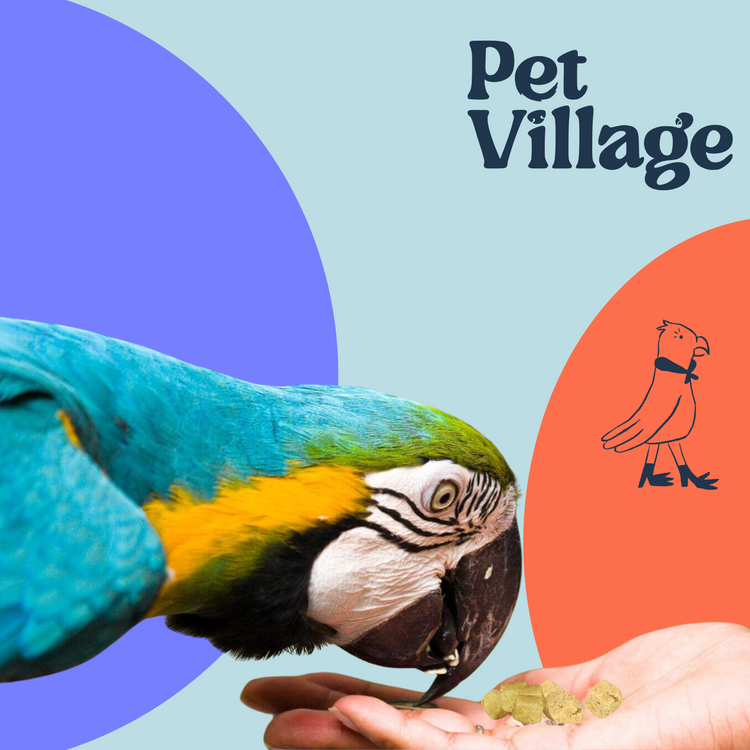What Parrots Can and Can’t Eat: A Fun Guide to a Healthy Diet

Parrots are smart, social creatures who love a tasty meal just like you! But remember, not everything on your plate is parrot-friendly. A balanced diet is key to their health and joy. Check out our guide for parrot-approved foods and those to avoid.
What Parrots Can Eat
A colourful parrot menu includes fresh fruits, veggies, nuts, seeds, and high-quality pellets. Here's the yummy stuff they love:
Fruits (Vitamins and Hydration Packed):
-
Apples (no seeds) – Fibre and vitamin C rich.
-
Bananas – Energy-packed with potassium.
-
Berries (strawberries, blueberries, raspberries, blackberries) – Antioxidant-rich.
-
Grapes – Hydrating with natural sugars.
-
Mangoes – Vitamin A for healthy eyes.
-
Papayas – Digestive enzymes for gut health.
-
Pears – High fibre for digestion.
-
Pineapple – Immunity boost with vitamin C.
-
Pomegranates – Antioxidant-packed.
-
Melons (watermelon, cantaloupe, honeydew) – Hydrating and vitamin A rich.
-
Citrus fruits (oranges, tangerines—watch the acidity!) – Vitamin C for a strong immune system.
Veggies (Essential Nutrient Rich):
-
Carrots – Beta-carotene for sharp vision.
-
Broccoli – Calcium and fibre for bones and digestion.
-
Kale – High in calcium and antioxidants.
-
Spinach (in moderation due to oxalates) – Iron-rich but use sparingly.
-
Sweet potatoes (cooked) – Vitamin A and fibre rich.
-
Bell peppers – Vitamin C and colourful fun.
-
Cucumbers – Refreshing and hydrating.
-
Green beans – Vitamins K and C packed.
-
Peas – Protein for muscle health.
-
Corn – Tasty energy booster.
-
Squash – High fibre and beta-carotene.
Grains and Legumes (Protein and Energy Boosters):
-
Brown rice – Whole grain energy source.
-
Quinoa – Protein-rich and gluten-free.
-
Whole wheat pasta (plain) – Complex carbs for sustained energy.
-
Lentils – Protein and fibre rich.
-
Chickpeas – Protein source for feather health.
-
Cooked beans (kidney, black, pinto—NEVER raw!) – Fibre-rich and heart-healthy.
Nuts and Seeds (Healthy Fats in Moderation):
-
Almonds – Heart-healthy fats and protein.
-
Walnuts – Omega-3s for brain health.
-
Cashews – Mineral-rich, like magnesium.
-
Pistachios (UNSALTED) – Protein and antioxidant-rich.
-
Pumpkin seeds – Immune support.
-
Sunflower seeds (special treat) – Tasty but high in fat.
Other Parrot Pleasers:
-
Cooked eggs (protein punch) – Essential amino acids for strong muscles.
-
Plain popcorn (no salt, no butter) – Fun, low-calorie snack.
-
Plain, unsweetened yogurt (tiny doses) – Probiotics for gut health.
-
Sprouts (alfalfa, lentil, mung bean, etc.) – Enzyme-rich and great for digestion.
What Parrots Can’t Eat
Some human treats are parrot no-gos. Keep these off the menu:
Toxic Foods:
-
Avocado – Persin danger! Causes heart issues.
-
Chocolate – Theobromine and caffeine are fatal.
-
Caffeine (tea, coffee, soda) – Heart and hyperactivity issues.
-
Onions and Garlic – Digestive problems and anemia.
-
Alcohol – Liver trouble in even a sip.
-
Salt – Dehydration and kidney issues.
Harmful Foods:
-
Apple Seeds & Fruit Pits – Cyanide risk! Remove seeds before feeding.
-
Dairy (milk, cheese, butter) – Lactose intolerance leads to digestion issues.
-
Raw Beans – Cooking removes harmful toxins.
-
Mushrooms – Some varieties cause digestive upsets and toxicity.
-
Sugary or Processed Foods – Obesity and metabolic issues.
-
Fatty and Fried Foods – Unhealthy fats harm liver health.
Final Feeding Tips for Your Parrot
-
Wash fruits and veggies to remove pesticides.
-
Introduce new foods gradually to monitor reactions.
-
Balance is key; seeds alone aren't enough for nutrients.
-
Fresh water is essential for your feathered friend!
Follow these tips, and your feathered friends will be a happy, vibrant companion. When unsure about food safety, ask your vet!
Love
Our Pet Village Crew 





